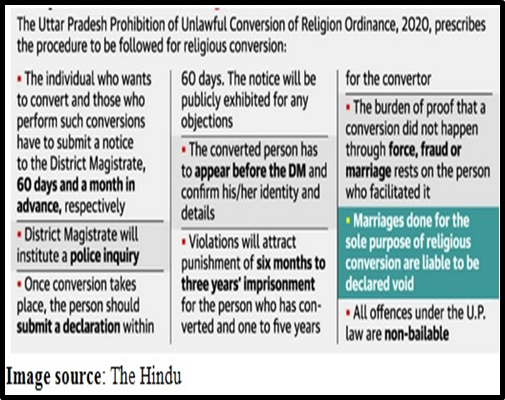U.P.’S ANTI-CONVERSION LAW AMENDMENTS FACE CRITICISM
Why in the news?
U.P. ‘s anti-conversion law amendments increase penalties and bail restrictions, raising concerns about misuse and infringement on fundamental rights.
source:thehindu
About Amendments to U.P.’s Anti-Conversion Law:
- Stricter Provisions
- Amendments to the Uttar Pradesh Prohibition of Unlawful Conversion of Religion Act, 2021, increase jail terms, up to life imprisonment for coercive conversions targeting minors, women, or specific communities.
- Introduces harsh penalties for foreign funding related to unlawful conversions.
- Bail and Complaint Procedures
- New bail provisions require the public prosecutor to oppose bail, with stringent conditions on proving innocence and likelihood of reoffending.
- Any individual can file complaints of forced or fraudulent conversions, broadening scope for misuse and targeting inter-faith marriages.
- Concerns and Criticisms
- The amendments exacerbate fundamental rights violations and are criticised for medieval-mindedness.
- Questions arise about the law’s validity and its impact on inter-faith marriages, with concerns about potential misuse and whether actual forced conversions are increasing.
Uttar Pradesh Prohibition of Unlawful Conversion of Religion Act, 2021:
Key Constitutional Provisions on Religious Conversion:
|





